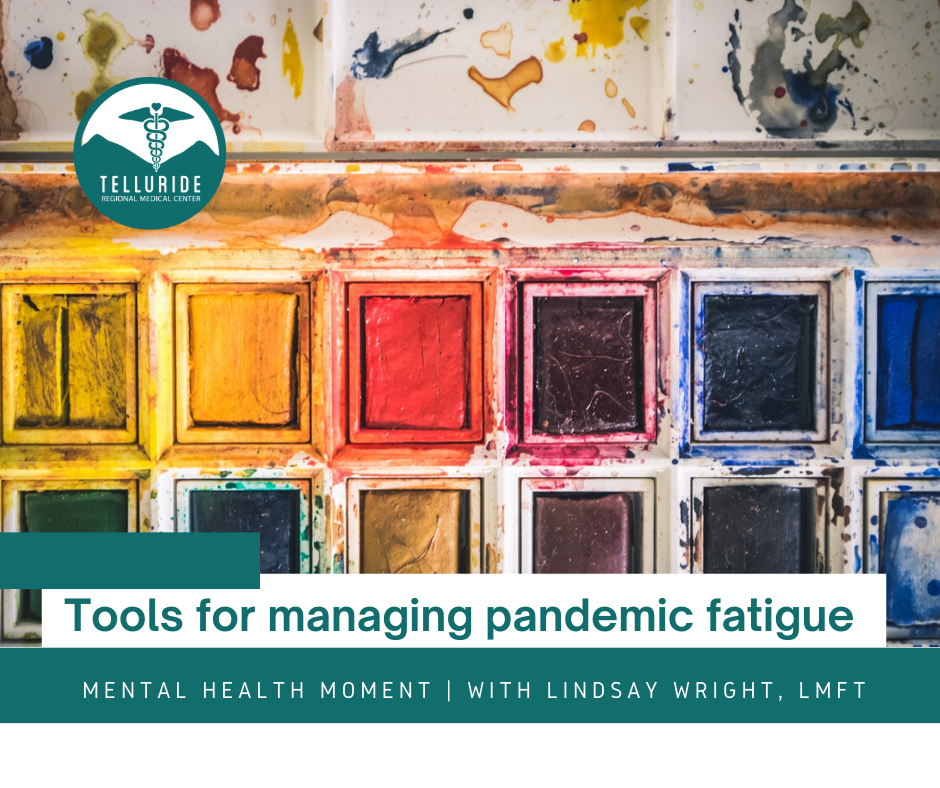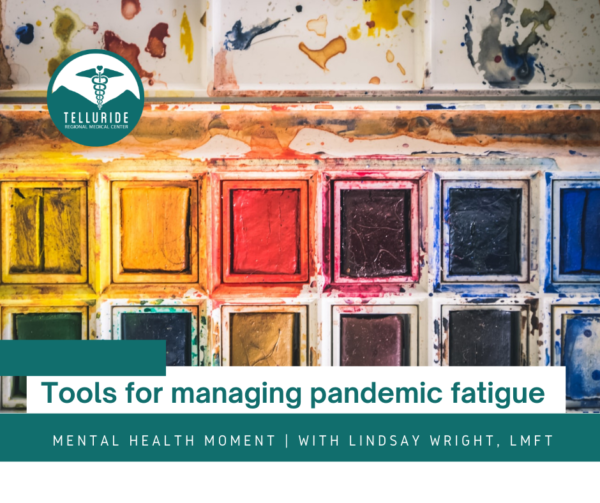
27 Nov Telluride Med Center: Pandemic Fatigue
For further information about the pandemic in the Telluride region, go to tellmed.org/coronavirus. For San Miguel County updates, go here.
If you are experiencing a mental health crisis, call The Center for Mental Health’s crisis line at 970.252.6220. For help with deep stress, Lindsay Wright can be reached by calling the Telluride Medical Center at 970-728-3848 or, if you are a patient, by messaging her through the Telluride Medical Center portal.
In this week’s Mental Health Moment, Lindsay offers tools for managing pandemic fatigue.

I‘m Lindsay Wright, a Licensed Marriage and Family Therapist and one of the Behavioral Health Counselors at the Telluride Medical Center.
We are firmly in the middle of off-season, and gearing up for the upcoming winter as well as in our ninth month of living with COVID-19.
As cases continue to climb, many of us have been experiencing pandemic fatigue.
What is pandemic fatigue?
While not a diagnosis within the DSM-5, pandemic fatigue is a collection of symptoms that can explain what many of us may be presently experiencing. Per Psychology Today, pandemic fatigue develops after “months of coping with the stressors of quarantines, social-distancing, shutdowns, losses, grief, uncertainty and anxiety” and may affect how we feel, think and behave.
Signs you may be experiencing pandemic fatigue include a decline in diligence following health precautions, decreased feelings of hope for the future, less patience and lower stress tolerance, stronger reactions to stressors, lack of interest in activities you might typically enjoy, exhaustion, difficulty focusing and increased intake of food, alcohol or other substances.
Luckily, there are ways we can counteract pandemic fatigue.
First off, we can consistently follow the five commitments:
• Wear a mask.
• Maintain six feet of physical distance.
• Minimize group size.
• Wash hands frequently.
• Stay home when sick and get tested.
By following safety precautions, you will not only help keep yourself and your community safe, but may also benefit from the experience of having some control over an uncertain situation by fostering a feeling of empowerment.
When you notice yourself experiencing frustration, anxiety or irritability, check in with yourself:
• What am I feeling right now?
• Why am I feeling this way?
• What can I do to change it?
Labeling your feelings is the first step towards being able to change them.
Another way to fight fatigue includes connecting with friends and family members who may also be experiencing the same feelings you are. Talking things through with someone you trust can help.
And finally, try new things!
Humans thrive on having new, novel experiences, and though they can be hard to organically come by during a pandemic, new experiences can help to release dopamine, and help us focus on something outside of ourselves. So try out a new hike, engage in an online class, or practice a new language.
In conclusion, remember that all of us are feeling the impacts of the pandemic, and be gentle with yourself.


Sorry, the comment form is closed at this time.